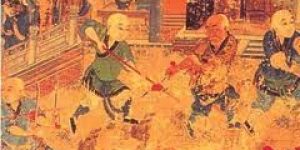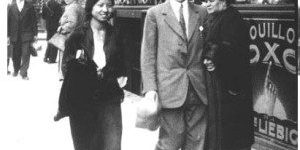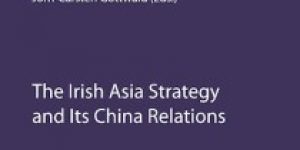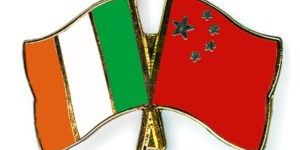Chapter 5: Creating an Asia Strategy ~ The Irish Asia Strategy and Its China Relations
No comments yet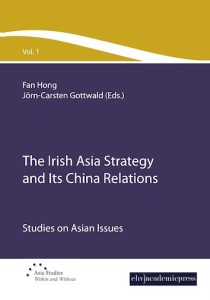 5.1 Introduction – the Context
5.1 Introduction – the Context
The emergence of the Asian economies as major economic forces over the past two decade has been nothing short of remarkable. Indeed China alone has enjoyed average annual growth rates in excess of 9% over the past twenty years to become the sixth largest economy in the world in terms of GDP and the second largest trading nation. India too has been achieving similar growth rates in recent years and is currently the world’s twelfth ranking economy in terms of GDP. The phenomenon has been such as to lead some commentators to dub the twenty-first century as the ‘Century of Asia’. This growing economic power brings with it an increasing ability to shape and influence political and economic developments throughout the world.
From an Irish perspective it is important in its own right that we should seek to foster strong political relations with these countries and this region. From an economic perspective, the emergence of these economies presents an important opportunity for Ireland. Success in international markets has been at the core of our economic development and will be the driving force for our long-term economic growth.
This then was the background which helped shape thinking about Irish/Asian relationships. Other key issues which helped focus attention on the Asian region included:
– The very high level of sophistication, both in terms of their production methods and their products, being achieved by the more advanced Asian economies. That sophistication presented clear opportunities for Irish companies, especially in the high-tech sectors, both in terms of sales and in partnerships/investment relationships.
– The performance of the Asian economies over previous years and, in particular, the manner in which they recovered from the crises of 1997-1998, reaffirmed the importance of this region to global commerce.
– Average growth since 1990 had been substantial in many Asian economies, most notably China, India, Malaysia, Singapore, Korea and Vietnam. Indeed the term devised to describe this growth, the ‘Asian Tiger’, was subsequently adapted to designate Ireland’s strong economic growth as the ‘Celtic Tiger’. Industrial growth had been phenomenal. The growth in services has also been impressive, reflecting greater productive specialisation as well as higher personal incomes.
5.2 Background to Irish Trade Development
The background to Irish trade development is that since the 1960’s, when Ireland’s trade was mostly with the UK (at one stage accounting for 75% of our exports), the Irish Government has endeavoured to support a diversification of our exports and develop new markets, both to expand the level of exports overall and to avoid over-dependence on any single area. The success of this policy, driven by strong levels of inward foreign direct investment, a benign enterprise environment, the development of the Single Market, and other appropriate framework conditions, has led to the current position (2007) where some 60% of our exports go to EU countries, the USA is our single largest export market (about 20%) and our exports to Britain are now down to just under 20%. Nevertheless, despite this more balanced position, there is an imperative for our companies and enterprises to continually seek out new markets and be aware of regions of the world which are showing strong growth conditions. With increasing globalisation, expanded membership of the World Trade Organisation (WTO), the success of the WTO in lowering tariffs worldwide and cheaper transport costs, more distant markets require an increased level of attention and support so as to capture the opportunities they present.
5.3 The Emergence of the Asia Strategy
There was a realisation that there was a need to bring focus and coherence to both Government and private sector endeavour to strengthen political and economic relationships with Asia. The actual catalyst for the development of an ‘Asia Strategy’, as such, derived from the visit by the Taoiseach, Mr. Bertie Ahern TD and other delegates, to China in 1998. It was considered that such a strategy would establish a formal context in which the public and private sectors could work cooperatively to realise the economic and other benefits that deeper political and economic linkages with Asian countries can confer. Following a wide-ranging consultation with both public and private bodies, the ‘Asia Strategy 1999 to 2004’ was developed and adopted. Its aims were to increase the proportion of Irish exports going to Asia, exploring new opportunities in a fast developing part of the world and developing partnerships and investment in the region.
The Strategy set out a series of challenging targets and objectives for the first five years (1999 –2004) of what was envisaged to be a ten year programme. An essential starting point was the initiation of an extensive campaign of raising awareness of Ireland with key decision makers in Asia. This awareness campaign included the preparation of publications and information material, more inward and outward visits (including Trade Missions) and the expansion of diplomatic activities. In addition, specific targets were set for export expansion and increasing the level of Irish company activity in the region.
5.4 The Indigenous Sector and the Role of Enterprise Ireland
Government trade policy has for many years focussed on assisting the indigenous i.e. Irish owned firms to develop their export potential, as they are less well able to develop new export markets than multinational companies, who are considered to have sufficient resources to develop their own exporting activities. In pursuance of this policy, the development agency Enterprise Ireland, was established in 1998 in a consolidation of various State development agencies. This agency works to accelerate the development of world-class Irish companies to achieve strong positions in global markets. A significant area of its activity is to help companies achieve export sales and it took over the role on trade promotion from the former Irish Trade Board. Enterprise Ireland has over 30 offices overseas and, as an agency of the Department of Enterprise, Trade and Employment, is the key body to implement the Department’s Trade agenda, including the Asia Strategy. The work of Enterprise Ireland was therefore considered crucial in supporting Irish indigenous companies make a break-through into Asian markets in pursuit of the aims of the Asia Strategy. By 2004 Enterprise Ireland (EI) had established offices in Shanghai, Beijing, Hong Kong, Guangzhou, Kuala Lumpur, Singapore, Seoul and Tokyo. They also operated in other locations in Asia as the commercial section of an Embassy or Consulate. In all cases, the level of coordination and communication between diplomatic missions and the State’s trade promotion agencies – particularly Enterprise Ireland – is of the highest standard.
5.5 Role of Irish Embassies Abroad
Embassies also play a vital role abroad in enhancing both political and economic relations. They are the eyes and ears in their country of accreditation, the interface with the local administration, and key network facilitators and door-openers for enterprises seeking to do business in those countries. They coordinate very closely with the economic promotional agencies within the region to develop plans for the development of foreign earnings and they use their own resources to build on the efforts of the agencies where appropriate. Without the support of the Embassy in many countries it would be very difficult to gain appropriate access for trade missions and visiting official delegations seeking to enhance economic relations. Embassy officials establish significant commercial contacts in their work. The Embassies’ wider role in the development of relations – at political and cultural levels, for instance – also contributes to the awareness of Ireland in Asia at the economic level. Their engagement in the development and implementation of the strategy is indispensable.
5.6 Progress during the First Phase
During the period 1999 – 2004 the various tasks as set out in the strategy document were pursued vigorously and a review of progress was undertaken in 2004. The outcome can be summarised as follows:
Awareness Raising
Extensive work has been undertaken to raise awareness of Ireland among key economic and political decision-makers in Asia and a total of € 2 million was expended for this purpose. Financial and logistical support was given for visits to Ireland by key media personnel and others, with roles in informing opinion and relaying information in Asia. A wide range of publications was produced by various bodies. In addition, exhibitions and conferences were supported. As well as the direct involvement by state bodies, some of these initiatives were undertaken (with State funding) by organisations such as IBEC, the Irish Exporters Association, the Chambers of Commerce in Ireland and the Educational group MEI-RELSA. Progress was also made in the development of long-term institutional arrangements between representative Irish business organisations and their counterparts in Asian countries.
High Level outward visits
– In 2000 the then Tánaiste and Minister for Enterprise, Trade and Employment, Ms. Mary Harney TD, led a multi-sectoral trade mission to China with 51 participating companies.
– A trade mission to Japan was organised in 2001 with 50 companies; a major education exhibition was held in China with 21 participants the same year.
– An education and software mission to India in 2002 with 20 participants was led by Minister of State Mr. Michael Ahern TD.
– The then largest ever trade mission to China was led by President McAleese in 2003 with 84 companies participating; and a first ever trade mission to Vietnam was organised in the same year.
– In late 2004, then Taoiseach Bertie Ahern paid an official visit to Vietnam (the first visit of an Irish Taoiseach to Vietnam). Over the course of his trip he also paid official visits to Malaysia, Singapore and Bahrain.
– A multi-sectoral trade mission, led by then Minister for Enterprise Trade and Employment, Mr. Mícheál Martin TD, visited Korea and Japan in mid-November 2004. Over 40 companies participated in this first ever trade mission to Korea.
Inward visits
– A number of inward visits were arranged by Enterprise Ireland from the region, with over 60 delegations at official and business level visiting Ireland. The majority of these have come from China and, overall this level of activity is evidence of the growing profile Ireland enjoys in the region as a whole.
– Significant political highlights over the course of the first phase of the Asia Strategy programme included a visits Premiers Zhu Rongji and Wen Jiabao.
Progress on Trade
From a bilateral trade development perspective, the following advances have been achieved:
– In the course of the Asia Strategy 1999 to 2004, trade exports have increased from € 3.6 billion to about € 6 billion to the region as a whole.
– Total exports to Asian countries from indigenous Irish companies are estimated at € 321 million in 2003, an increase of about 15% on the 1997 level.
– Exports to China increased dramatically – annual export growth averaged around 20% between 1997 and 2003.
– The resource commitment that Irish companies are making to the region has manifested itself through the increasing numbers that have established a market presence there, as against making occasional visits. Market based presence of Irish owned companies had increased from 46 in 1999 to 93 in 2003.
– Since the inception of the Asia Strategy, diplomatic representation in the region was increased by the allocation of additional diplomats to the Embassies in Tokyo and Beijing, the opening of an Embassy in Singapore and the opening of a Consulate in Shanghai.
5.7 Next Phase of the Strategy
Given the progress which was made and the potential still to be realised, it was recognised that there was a need to further build on these achievements by extending and adapting the strategy, as necessary, for a further five years i.e. 2005 – 2009.
On the basis that Asia is a huge geographic area with widely differing population densities and economic characteristics, it was recognised, in terms of optimum deployment of resources, that there would have to be some selectivity in terms of the focus of the strategy. Eight countries in particular were chosen viz. China, India, Japan, South Korea, Malaysia, Singapore, Indonesia and Vietnam. This is not to the exclusion of developing business and trade relationships with other emerging economies in the region, in particular, Thailand and the Philippines, as opportunities present themselves.
A focussed second phase of the strategy for these eight countries to cover the period 2005 – 2009 was drawn up and launched by then Taoiseach Mr. Bertie Ahern, TD, and then Minister for Enterprise Trade Employment, Mr. Mícheál Martin TD, in April 2005. This strategy sets out a number of key objectives, the most significant being a target for the value of goods exports to the priority countries to reach € 9 billion by 2009.
Some of the significant other targets are as follows:
– Make progress on the legal and other issues involved in Ireland joining the Asia Development Bank (ADB)[i].
– Education targets to 2009 – 17,000 incoming students from the priority countries, including Malaysia (2,500), China (>5,000), India (4,000), Korea (1,000).
– Initiate a three year tourism development programme in China.
– Tourism target – 150,000 from all Asia.
– Goals of increasing dairy products sales and the establishment and expansion of trade in pigmeat, beef, food ingredients and alcoholic drinks to Asia.
– Goal of attaining agricultural products sales of € 390 million to Asia by 2009.
– Increase the profile of Ireland as a supplier of quality food and drink.
– Increase the exports of seafood and related products to Asia.
– Pursue Enterprise Ireland’s target of establishing 215 Irish companies in Asia by 2009 and, in addition, actively market educational services.
– Continue the programme of structured high-level visits to the region, which help to deepen relations at a political level and raise Ireland’s profile.
– Continue our programme of targeted visits by journalists from the region.
– Synergies with Culture Ireland in relation to the Asia strategy.
– Increase and diversify college- to- college links and cooperative arrangements.
– Progress on implementation of the report on the Internationalisation of Irish Education Services.
– Develop a focussed Graduate placement programme.
– Reinforce progress of collaboration between Science Foundation Ireland and counterpart Asian organisations.
The strategy is being monitored by a High Level Oversight Group. It is chaired by myself, as Secretary General of the Department of Enterprise, Trade and Employment. Other members include a small number of Departmental/Agency representatives and some specialists from the private sector. The group held its first meeting in late 2005 and has met regularly since.
5.8 Progress in First Two Years of the Second Phase of Asia Strategy (2005 – 2007)
5.8.1 Overall Export Target
The core objective of the Asia Strategy 2005-2009 is to develop relationships between Governments, business organisations and Irish and Asian peoples generally. This is in support of the central focus on increasing the value of Irish goods exports to priority countries to € 9 billion by 2009.
Merchandise exports to the priority countries have remained relatively unchanged and stood at € 5.87 bn in 2006. The trend is that the level of these exports has remained fairly static. On the other hand the volume of Services exports to Asia have grown at an exponential rate. As a result, service exports to the eight priority countries increased from € 1.2 bn to € 2.6 bn between 2004 and 2005 and in respect of the entire Asia region from € 2.4bn to € 3.4 bn in the same period.
5.8.2 Trade Missions
The January 2005 Trade Mission to China, led by then Taoiseach Bertie Ahern and accompanied by then Minister for Enterprise, Trade and Employment, Mr. Micheál Martin TD; then Minister for Agriculture Ms. Mary Coughlan TD; then Minister for Education and Science Ms. Mary Hanafin TD and then Minister for Communications, Marine and Natural Resources, Mr. Noel Dempsey TD, was the largest in the history of the state to date. The mission, which visited Beijing, Shanghai and Hong Kong involved a total of 121 Irish companies and educational institutions, primarily involved in the ICT, Educational Services, Environmental and Engineering Services, Medical Devices and Food and Drinks sectors. A wide range of events and activities were organised by Enterprise Ireland. A total of 41 contract singing ceremonies were organised and the value of these contracts totalled € 125m. Exports to China increased by 42% in 2005 from € 639m the previous year.
A successful Trade Mission to India was organised in January 2006, led by the Taoiseach and accompanied by three Government Ministers. Eighty five businesses took part, including some from Northern Ireland. Exports to India increased by 18% between 2005 and 2006. Then Minister for Enterprise Trade and Employment, Mícheál Martin, T.D., led a Trade Mission to Japan in June 2006. Since the Minister’s earlier visit to that country in 2004, indigenous exports to Japan had increased by 13%, numbers of Irish companies with offices in Japan had increased from 24 to 32 and numbers employed by Irish companies in Japan had more than doubled.
Later in 2006, the Minister of State for Trade and Commerce, Mr. Michael Ahern TD led a Trade Mission to China.
5.8.3 Enterprise Ireland Activities in the Region
Significant progress has been made by EI towards achieving the target of having 215 Irish companies active in the Asia Strategy region by 2009, with a total of 210 currently, up from 112 in 2004.
During 2006, EI organised a total of 46 events to promote exports to the various Asian markets. The number of EI offices in the region has now risen to 10, with the opening of a new office in New Delhi, India (announced during the Taoiseach–led Trade Mission in 2006).
5.8.4 Educational Objectives
The promotion of Irish Educational Services abroad, i.e. attracting foreign students to study in Irish Educational establishments, is a key contributor to Foreign Earnings and represents the export of a service, just as the export of software or financial systems represents the export of a service. The sale of such educational places abroad is a growing category of our Services Trade.
Enterprise Ireland devotes considerable effort to attracting these students to Ireland and the Asian market shows particular promise. Enterprise Ireland is now working with the major Universities, the Institutes of Technology and the independent colleges, in foreign markets. A number of universities and colleges have established direct linkages with Asian counterparts. Some examples are the Royal College of Surgeons in Ireland (RCSI)/Penang Medical College in Malaysia, University College Cork/Shanghai University, Dublin Institute of Technology/Fudan University and University of Limerick/ University in Hangzhou, China.
A large number of missions and events are organised by EI to promote education. Countries visited include Malaysia, Singapore, Vietnam, Japan, Korea, China, India, Pakistan and Thailand. There are now just over 7,500 students from the Asia Strategy Region enrolled in the third level sector in Ireland – 49% of the total number of non-EU international students. The number of students has grown by over 85% since the academic year 2002/2003. The target for 2009 is 17,000.
Arrangements are in train to establish ‘Education Ireland’ as a company, with a view to its being set up on a statutory basis within 12 months. This was a key recommendation of the Internationalisation of Irish Educational Services report, published by the Department of Education and Science and that Department is finalising the necessary process. The report highlights the opportunities for this sector and identifies the strategies to be adopted in ensuring that adequate systems and procedures are put in place to make Ireland a competitive and attractive location for quality educational services. This new body will be a central agency to coordinate policy development and advise the Minister for Education and Science on policy for the development of international education and to be responsible for the promotion of Ireland as a centre of educational excellence. Setting up the new organisation will involve the bringing together of two existing bodies, International Education Board Ireland (IEBI) and the Advisory Council for English Language Schools (ACELS). It is therefore intended to put the management and regulation of this sector on a sound footing, with a single agency to coordinate policy, have responsibility for the award of Quality Mark and manage the operation of a code of conduct and the certification of the English as a Foreign Language (EFL) schools. Primary legislation to set up Education Ireland on a statutory basis will be enacted in due course. Science Foundation Ireland has established formal active collaborative arrangements with both China and India.
5.8.5 Food /Drink and Tourism
In relation to the goal of increasing food and drink sales, these rose 21% in 2005 to € 294m and by a further 10% to about € 325m in 2006. (The 2009 target is € 390m and therefore very likely to be achieved). Bord Bia has committed extra resources to the Asian market, has carried out country-specific research and is opening a full time office in Shanghai.
A Tourism target of 150,000 visitors from all of Asia by 2009 was set. In 2006, we attracted 19,700 visitors from Japan and 81,200 for the rest of Asia and Middle East combined.
5.8.6 Other Initiatives
Ireland has continued its active role in encouraging trade and other links with Asia, across the range of multilateral fora, including at EU level and in the World Trade Organisation. Working holiday visa arrangements have been negotiated with several of the countries in the region.
The legislation to facilitate Ireland joining the Asia Development Bank was enacted and the necessary administrative arrangements were made (by Department of Finance), for Ireland to formally join. This process should facilitate Irish companies in securing contracts funded by the Bank in the region.
A considerable number of Irish Business and Alumni Associations have been established in the region. Other, less high profile, targets on Academic/Educational links are being progressed. In June 2006 a successful session of the Irish-Chinese Joint Commission was held under the auspices of the Department of Enterprise, Trade and Employment, with its counterpart Ministry in Beijing. This Joint Commission is a bilateral forum that meets every two years, with the objective of developing closer links and of resolving any trade related difficulties between the two countries. Several issues that arose in the discussions are being progressed on an ongoing basis.
In March 2007, the first Ireland-China International Software Conference was hosted in Dublin. The two day event, organised by the Department of Enterprise Trade and Employment, in association with Enterprise Ireland, brought together 80 Irish and 23 Chinese companies. A range of ‘one to one’ company meetings, to encourage linkages and partnering, was arranged and relevant visits to Software and Educational facilities were organised for the Chinese delegation.
5.8.7 Department of Foreign Affairs Activities
The Department of Foreign Affairs and its Embassies/Consulates in the Asian region have been active in cooperation with government departments and state agencies to support and implement the Asia Strategy. An important part of this work has been the organisation of high-level inward and outward visits. Awareness raising activities, supported by that Department’s Asia Strategy funds, have included an internship exchange programme and a number of TV and print media visits. Activities in the educational area included a significant sectoral study, support for third level institutional linkages and the development of Irish studies in prestigious universities. A key part of the work of missions in the region is the important interaction and representation with economic ministries, where the development of Irish economic interests with respective countries are discussed and advanced. In accordance with the Government’s decision, an Embassy was established in Vietnam, with secondary accreditation to Laos and Cambodia. The embassy in Hanoi has been active in promoting Irish trade and investment in the region and has also a crucial role in administering Ireland’s Development Aid programme.
5.9 Conclusion
The core objective of the Asia Strategy 2005-2009 – the development of relationships at political, economic, trade, educational and other policy fields, in support of Irish trade to the priority countries – continues to be implemented in a rigorous and coherent manner. As a result of a strong commitment on the part of all stakeholders, and the resultant extent of engagement with the priority countries and other countries in the Asian region, Irish exports into key markets have continued to increase and all other indicators are very positive. In particular, the growth of service exports to Asia has been excellent and individual targets for Enterprise Ireland activities, on food exports, educational initiatives and some other fields are progressing very well. It is considered that the impact of Trade Missions to the region is very beneficial and it is hoped that further high profile missions will be organised in future years.
We can look at this entire Asia Strategy process with a reasonable sense of achievement. We have now arrived at a stage, still with two years to go, where Asia is significantly higher in all our consciousness and Irish businesses are much more active in the region. Various linkages and initiatives have progressed very well and considerable political and business gains have been made. We look forward to continued growth and progress towards the ambitious aims of the Strategy.
NOTE
[i] Advantages deriving from membership of the Asia Development Bank can include opportunities for Irish companies and consultants to tender for projects funded by the Asian Development Bank.
You May Also Like
Comments
Leave a Reply


